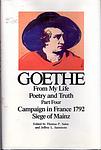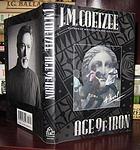J M Coetzee
J. M. Coetzee is a South African-born novelist, essayist, linguist, and translator. He is known for his complex and introspective narratives, often dealing with the themes of human rights, animal rights, and the effects of colonialism. Coetzee has been awarded the Nobel Prize in Literature in 2003 and is the author of several acclaimed novels, including 'Disgrace', 'Waiting for the Barbarians', and 'Life & Times of Michael K'. His writing style is characterized by its spare prose and the use of allegory. Coetzee has also won the Booker Prize twice, making him one of the most distinguished authors in contemporary literature.
Books
This list of books are ONLY the books that have been ranked on the lists that are aggregated on this site. This is not a comprehensive list of all books by this author.
-
1. Disgrace
"Disgrace" is a novel that explores the life of a middle-aged professor in South Africa who is dismissed from his position after having an affair with a student. After losing his job, he moves to the countryside to live with his daughter, where they experience a violent attack that significantly alters their lives. The story delves into themes of post-apartheid South Africa, racial tension, sexual exploitation, and the struggle for personal redemption.
-
2. Waiting for the Barbarians
The novel is set in a small frontier town of an unnamed empire, where the magistrate lives a life of civil service and relative peace. His world is disrupted when the Empire declares a state of emergency due to rumors of barbarian uprising. The magistrate becomes a critic of the Empire's brutal and inhumane methods of dealing with the perceived threat, which leads to his arrest and torture. As he tries to understand his role in the vast political machinery, he also grapples with questions of power, justice, and humanity.
-
3. Life & Times of Michael K
Set in South Africa during a civil war, the novel follows the journey of Michael K, a simple gardener with a cleft lip. When his mother falls ill, he attempts to take her back to her rural birthplace. After she dies en route, Michael continues the journey alone, struggling to survive in a war-torn landscape, while also being caught up in the bureaucratic red tape of the dystopian society. The story explores themes of freedom, survival, and the human spirit's resilience against adversity.
-
4. Dusklands
"Dusklands" is a novel divided into two distinct parts, each examining the theme of imperialism. The first part follows a psychologically unstable American government researcher during the Vietnam War, who is tasked with developing propaganda to justify the conflict. The second part is a historical narrative set in the 18th century, exploring the violent colonization of South Africa by the Dutch. The stories parallel each other, highlighting the destructive nature of imperialism and the psychological effects it has on individuals.
-
5. In the Heart of the Country
Set in South Africa, this novel tells the story of a woman living on a remote farm who is isolated not only geographically but also emotionally and psychologically. After her father marries his young mistress, the protagonist's life spirals into madness and tragedy. The narrative explores themes of loneliness, power dynamics, and the harsh realities of life in apartheid-era South Africa, all presented through the protagonist's fragmented and unreliable perspective.
-
6. Elizabeth Costello
The novel follows the life of Elizabeth Costello, a renowned Australian writer, as she navigates through her twilight years. Through eight different narratives, the book explores her perspectives on various topics, including animal rights, the nature of evil, and the difficulty of understanding oneself. The novel is a profound exploration of the human condition, the nature of storytelling, and the conflict between life and art.
-
7. Boyhood: Scenes from provincial life
"Boyhood: Scenes from Provincial Life" is a semi-autobiographical novel that explores the author's childhood in South Africa during the apartheid era. The narrative delves into the complexities of family dynamics, racial tension, and the struggle of a young boy trying to understand his place in a divided society. The protagonist grapples with his identity, torn between his Afrikaner heritage and his English schooling, while also navigating the trials of adolescence. The book offers a poignant and often painful reflection on the formative years of a boy growing up in a fraught and turbulent time.
-
8. Age Of Iron
In "Age of Iron," the narrative unfolds through the eyes of a terminally ill classics professor in apartheid-era South Africa. As she confronts her impending death, she forms an unlikely bond with a homeless alcoholic man. Through their interactions and the backdrop of a society rife with inequality and violence, the novel explores themes of morality, mortality, and the complexities of human relationships. The protagonist's personal journey is set against the harsh realities of an oppressive political system, offering a poignant reflection on the human condition and the struggle for dignity amidst chaos and decay.
-
9. Foe
"Foe" is a novel that reimagines the classic tale of "Robinson Crusoe" through a postmodern lens, exploring themes of language, power, and colonialism. The story introduces a female character, Susan Barton, who finds herself cast away on the same island as Crusoe and Friday. Upon her return to England, she seeks out a writer to help tell her version of the events, but struggles with the erasure of her voice and the complexities of storytelling. The narrative delves into the silent history of Friday, whose tongue has been cut out, and the power dynamics between the characters, ultimately questioning the nature of truth and the ownership of stories.
-
10. Youth
"Youth" is a semi-autobiographical novel centered around a young man who leaves his homeland of South Africa for London in the 1960s, hoping to escape his oppressive and dull life. He seeks to immerse himself in the world of art and literature, yearning for a profound and transformative experience. However, he struggles to find his place in this new world, grappling with loneliness, unfulfilling jobs, and failed relationships. The book explores themes of alienation, the search for identity, and the disillusionment of youth.









